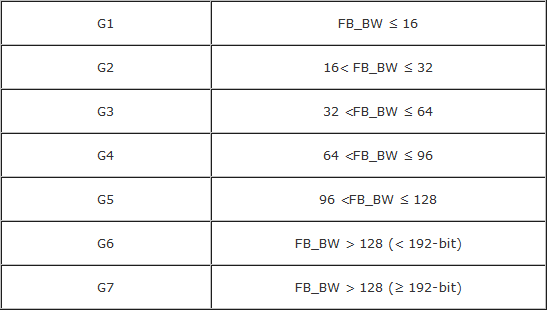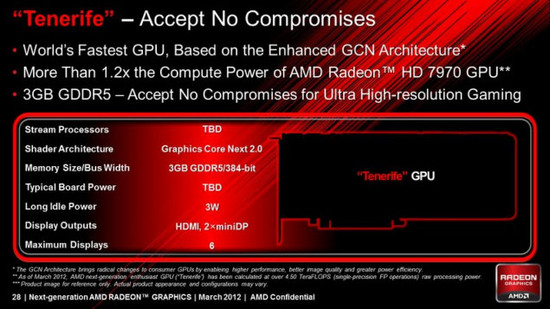NordicHardware has seen exclusive information about a new energy law that will apply within the EU. The law requires that both discrete and integrated graphics cards live up to certain energy standards. AMD is worried that this will affect next generation graphics cards and have them barred from sales in the EU.
There are standardizations that make sure pre-built computers, but also discrete components, achieve a certain level of energy efficiency. Exactly how much depends on a row of criteria. These standards also include simple things, such as that after a certain amount of time the computer will enter sleep mode. The idea behind this is to have as energy efficient computers as possible to reduce the overall consumption of energy. The specification for the so called Eco design Lot 3 with the EC can be found here, where there are hundreds of pages to read for those with lots of time to spare.
Update 2012/10/16 – 00:00: Due to misunderstandings we want to clarify that the link above is not the source for this article. We linked to this document only to show our readers roughly what Lot 3 was about. The original source is still someone within AMD, as mentioned later on in the article. Yours sincerely, NordicHardware.
 FB_BW is short for Buffer Bandwidth. What we call memory bandwidth in graphics cards
FB_BW is short for Buffer Bandwidth. What we call memory bandwidth in graphics cards
There are currently seven specifications for graphics cards – G1, G2, G3, G4, G5, G6 and G7. Graphics cards of the G7 classification have a bandwidth of 128 GB/s (GigaByte per Second) and more, without an upper limit today. The category depends on the performance – in this case measured in memory bandwidth. These GPU categories are also paired with a certain level of energy efficiency. If a graphics card doesn’t live up to the standard set by the EC it can be removed from all markets within the EU. The rules will now be constricted, which threatens next generation graphics cards.
The commission wants to stop dedicated graphics cards of group G7 from going above 320 GB/s – that is in theory a memory bus at 384-bit connected to memory operating at 6667 MHz or 512-bit with 5001 MHz. This is definitely within reach for the next generation graphics cards. Radeon HD 7970 GHz Edition currently has a bandwidth of 288 GB/s with a 384-bit memory bus and 6000 MHz memory. For notebooks the limit will be only 225 GB/s.
Update 2012/10/17 15:00: After feedback from our valued readers it has been made clear that the graphics cards above said bandwidth are exempts to the regulation. Meaning that the very high-end (future) graphics cards aren’t in danger. AMD are however still worried about their current generation and future generation graphics cards in the HD 8000-family due to the changes since it applies to all segments under said bandwidth.
Besides that the energy efficiency requirements will be tighter – in this case the energy consumption of the card in relation to its memory bandwidth. Performance delivered in games or general calculations are irrelevant. according to Lot 3. Exactly what the “performance” and energy consumption quote looks like we don’t know at the time of writing, but it will also affect cards in the entry level segment and not just performance and enthusiast cards. The quote is strict enough to worry AMD.
Future generations are in danger
According to data NordicHardware has seen from a high level employee at AMD, current graphics cards are unable to meet with these requirements. This includes “GPUs like Cape Verde and Tahiti”, that is used in the HD 7700 and HD 7900 series, and can’t meet with the new guidelines, the same goes for the older “Caicos” that is used in the HD 6500/6600 and HD 7500/7600 series. Also “Oland” is mentioned, which is a future performance circuit from AMD, that according to rumors will be used in the future HD 8800 series. What worries AMD the most is how this will affect future graphics cards since the changes in Lot 3 will go into effect soon. The changes will of course affect Nvidia as much as it will AMD.
 The commission guidelines could be too strict for next generation graphics cards
The commission guidelines could be too strict for next generation graphics cards
Earlier today there were talk about the new restrictions going into effect in early 2013, but now it looks like it will be 2014. This will put nearly unrealistic demands on both AMD and Nvidia. Besides the fact the standardization is not very logical since memory bandwidth does not translate into performance that easily we see it as a great obstacle for future graphics cards, but the revision of “Lot 3” is done and the wheels are set in motion.
According to a report published in August this year the current roadmaps [from AMD and Nvidia] does not support the new requirements up until 30 months into the future. The changes in Lot 3 will therefore be introduced in steps. The first will be in 2013 or 2014 as mentioned above, and thereafter new restrictions will apply in 2015. OEM companies like Dell and HP are well aware of this and worried about how this will affect their operations. The changes should also affect retail graphics cards and home builders.
Graphics card energy consumption has been rising steadily over the last couple of years. Last generation the limit for the PCI Express standard was broken when graphics cards sporting two GPUs consumed well over 300 watt, both from AMD and Nvidia. Both us and our well informed readers think that the way the EC is applying its restrictions is wrong, especially how it has decided to estimate performance. AMD is planning on making an official statement and hopefully the EC will listen. We have not been able to reach Nvidia for a comment on this issue, but hopefully they share AMD’s concern.
We definitely feel that restrictions that lead to more efficient hardware is a good thing, but it needs to be done properly with the affected companies being involved in the discussion. We will of course follow up on this and return with more information when possible.
After our initial report AMD reached out to us to comment on the matter and their official stance is below:
“AMD recognizes the considerable and valuable work of the European Commission in the development of the EcoDesign Directive (ErP) Lot 3 for PCs and Monitors. AMD has a steady history of lowering power consumption of our technology, and working with policy makers and stakeholders around the world to implement meaningful regulation. We will continue contributing to the development of a viable EU Regulation that can benefit consumers and business, fuel the ongoing development of innovative technologies and ensure regional competitiveness. As this effort by the EC has yet to be finalized, AMD has not and will not comment on speculation surrounding the draft regulation.”
We will follow up with another article tomorrow regarding the subject.
















EU was supposed to be a TRADE UNION not a US copy cat.Then we got the Euro that was a big fail from the start since people and their cultures is’n the same everywhere resulting in economical differences.And now they want to impose even more rules on us in the form of “Protect the environment” and “Think of the children”. Focus on the industries and cars. Maybe even the power plants using fossil fuels if you’re bored. The best would be if you could do something about china and USA since they’re pretty much the ones spitting out the most… Läs hela »
One word, TAX.
AMD and Nvidia will be taxed if they fail to comply. Just another money making racket.
I would not worry, EU generally are relaxed with laws, prosecution for Fraud being one of them, corruption being another.
Yes, because enforcing safety requirements or mileage on automobiles has ‘crippled’ the auto business … As for China, most of that CO2 is spit out making cheap crap for western markets. Obscene power-hungry graphics cards included. What was the last graphics card manufactured in your country ? Look it up, the last western-made mass consumer graphics card was a 512k ISA ATI card from the dark ages … I have one at home on a shelf, mounted on a plexiglass plate. If they ‘do something’ about China, it will come back to you instantly, because CO2 is produced in industrial… Läs hela »
Ofcourse EU wants that every producer of graphic cards pay them for that certification? ;/ Besides they are asking just for bandwidth? That’s silly…
Mr Hugosson, you realise that the single piece of evidence you linked, the report from directive 2005/32/EC is from 2007, that table about bandwidth buffers is from 2006 and in 2009 the directive was abandoned? Are you expecting us to believe the directive has secretly been re-instated and the EU overnight drew up some new laws to which only you are party? Did you also not realise that AMD is a stakeholder of MEERP and so is actively consulted on any energy directives since 2009? This is poor poor journalism.
This is ridiculous. Idle power is what matters for energy savings in the long run, and graphics card manufacturers made great progress there in the last few years. Modern Radeon cards consume less than 1W power when not in use. A bit more when using just 2D (browsing the web, reading, etc). Most of the time is spent doing these things rather than gaming. Limiting max memory bandwidth just doesn’t make sense.
Read the actual document people.
This is not policy.
This is not even draft policy.
THIS IS NOT EVEN RESEARCH INTO POLICY.
This is a PRELIMINARY REPORT that looks at potential solutions to rising energy costs and e-waste within the EU by helping people use less power. It merely outlines a variety of means through which this can be achieved in the EU. What is outlined in the shambolic article above is merely one part of this large, well sourced report.
Yet more BS made up by Europhobes.
@-- Herp DerpYeah, they’ve posted the wrong link (it’s an outdated preliminary study), the actual draft of the policy is here: http://www.eup-network.de/fileadmin/user_upload/Computers-Draft-Regulation-subject-to-ISC.PDF Now it should be mentioned that whoever wrote this article fails horribly at basic reading comprehension/is trying to grab attention by spewing sensationalist BS because the draft is BEING MISINTERPRETED HORRIBLY. THERE IS NO MENTION OF ACTUALLY TRYING TO LIMIT THE TOTAL POWER CONSUMPTION OF GPUS OR PERFORMANCE, THEY’RE JUST CATEGORISING THEM INTO DIFFERENT PERFORMANCE GROUPS AND SETTING REASONABLE LIMITS FOR IDLE/SLEEP POWER DRAW FOR EACH CATEGORY. Perfectly reasonable if you ask me, it can only benefit the… Läs hela »
[quote name=”WiSK”]Mr Hugosson, you realise that the single piece of evidence you linked, the report from directive 2005/32/EC is from 2007, that table about bandwidth buffers is from 2006 and in 2009 the directive was abandoned? Are you expecting us to believe the directive has secretly been re-instated and the EU overnight drew up some new laws to which only you are party? Did you also not realise that AMD is a stakeholder of MEERP and so is actively consulted on any energy directives since 2009? This is poor poor journalism.[/quote]If you took the time to read the article, you’d… Läs hela »
I understand energy efficiency, but i don’t understand how this could be regulated by using memory bandwith, instead of power consumption ??????
Retarded Mindset. Retarded Idea. Retarded Implementation. WHAT THE FUCK?!?! You don’t save the world by becoming Amish or fcking caveman for god’s sake, you save the world by moving forward!
I read the relevant document linked by HARP DARP and it becomes instantly clear that you completely misinterpreted the 320 GB/s bit, it’s actually a LOWER limit for a temporary exemption … ie. when you go over it (and some others) you DON’T have to comply with the regulations.
Also the regulation only affects “off”/sleep/idle power consumption … not on state power consumption.
Mistakes are human, but please amend this article ASAP … because you’re spreading FUD and misdirection.
OMG, they are all on drugs i bet
[quote name=”Harp Darp”]@-- Herp Derp
THIS IS NOT EVEN RESEARCH INTO POLICY.
This is a PRELIMINARY REPORT that looks at potential solutions to rising energy costs and e-waste within the EU by helping people use less power.[/quote]
Dear Harp, you seem like a nice guy but..well, you’re missing the point, so I state it clearly:
In the same way it’s not EU’s business to care about what lightbulbs people use, it’s not EU’s business to care in any way about how GPU manufacturers make their products.
Understood? Or shall I also recommend some undergraduate-level books on economics?
“We’ve heard of this directly from AMD who is seriously concerned about this as it could limit their future generations of GPU’s.”Whatever you heard, you didn’t understand it. The regulations (the draft is linked in comments above, not this report to amended directive you provide – http://www.eup-network.de/fileadmin/user_upload/Computers-Draft-Regulation-subject-to-ISC.PDF – divide computers into energy classes (like refrigerators for example). The classes of GPU are to this mean and the numbers are the same in the draft, there won’t be an upper limits. The numbers you provided – 320 and 225 GB/s – also appear in the draft and you completely misunderstood them.… Läs hela »
For scientists this is very bad news, we have applications that are much more constrained by memory bandwidth that 3D rendering.
Europe without TV channels, automotive and engineering design, games development and movie efects. Is autor of this bullshit is idiot??
Wow! Such a stupid hoax and people actually belive it. IMHO LOL. 😆
[quote name=”Im watching you”]EU was supposed to be a TRADE UNION not a US copy cat.Then we got the Euro that was a big fail from the start since people and their cultures is’n the same everywhere resulting in economical differences.And now they want to impose even more rules on us in the form of “Protect the environment” and “Think of the children”. Focus on the industries and cars. Maybe even the power plants using fossil fuels if you’re bored. The best would be if you could do something about china and USA since they’re pretty much the ones spitting… Läs hela »
You idiots. It doesn’t say that at all! It merely states that discrete GPUs above 320gbps are exempt from the requirements stated in 1.1.1 and 1.1.2. Learn to read. Category D desktop computers and integrated desktop computers meeting all of the following technical parameters are exempt from the requirements specified in points 1.1.1 and 1.1.2: (a) a minimum of six physical cores in the central processing unit (CPU); and (b) discrete GPU(s) providing total frame buffer bandwidths above 320 GB/s; and (c) a minimum 16GB of system memory; and (d) a PSU with a rated output power of at least… Läs hela »
The EU cottoning on to the fact that GFX cards are used in BitCoin mining… http://bitcoin.org/ good thing Butterfly Labs are releasing ASICs in a month or so http://www.butterflylabs.com/products/ so energy efficient mining will make this bill irrelevant 😛
This idiotic regulation is the last thing you’ll want to do. GPUs have a certain amount of power consumption “self regulation” in that if they get too hot, they get noisy and they require expensive cooling/power supply solutions. Consumers aren’t too fond of noisy, hot and expensive machines so the vast majority of cards sold aren’t the proverbial climate killers. There are however the proverbial climate killers, and they’re primarily sold to a very small minority of enthusiast users, and to supercomputer operators. It frankly doesn’t make sense to try to introduce regulation that only affects like 0.0001% of users… Läs hela »
[quote name=”Florian Bösch”]This idiotic regulation is the last thing you’ll want to do. GPUs have a certain amount of power consumption “self regulation” in that if they get too hot, they get noisy and they require expensive cooling/power supply solutions. Consumers aren’t too fond of noisy, hot and expensive machines so the vast majority of cards sold aren’t the proverbial climate killers. There are however the proverbial climate killers, and they’re primarily sold to a very small minority of enthusiast users, and to supercomputer operators. It frankly doesn’t make sense to try to introduce regulation that only affects like 0.0001%… Läs hela »
there is nothing about this article in that PDF!
On what should NordicHardware spend more time?
[ ] Communityfeatures
[ ] News
[ ] Tests
[ ] Blogs
[ ] Articles
[ ] Guides
[ ] Video content
[ ] Reports from fairs
[ ] Competitions
[ ] Gettogether members and crew
[x] Learning to read
Just wait til my pal God starts spewing commands.
He’s gonna be furious about you changing remote batteries and brainwashing — not informing the public of thermostat being main usage.
[quote name=”eiffel_g”]I understand energy efficiency, but i don’t understand how this could be regulated by using memory bandwith, instead of power consumption ??????[/quote]
Indeed – white-hat here…
I think it is less about GB/s, and more about PMK/s.
In which case they’re very sly presenting it as a “save the earth” energy idea.
Assuming this is at all real, is it possible this is really an attack on password crackers?
For those not aware: GPUs have uses in password cracking using specialized apps that re-purpose the graphics calculation engine.
Governments in general don’t like crypto tools in private hands…
Sorry for my late reply, I’ve been away on a trip up to now and having a stable connection in Italy was much easier said then done…
I can see we have misinterpreted the bandwidth thing and it has been changed accordingly. The rest of the article about AMD’s worries for current and future generation cards are however still valid as have also been pointed out by you guys.
Thanks for the replies and feedback, I admit this was clumsy of me and my late reply surely doesn’t make things look better either.
Yours sincerely,
Jacob Hugosson
The article is still not quite correct. Section 1.1.1 is only addressing power consumption during idle and sleep of the computer.
A computer can be exempt from the regulation, if it has a graphics card with more than 320 GB/s bandwidth, a six core CPU and several other parameters. (According to 1.1.3)
This exemption will only work until 30 months after the regulation came into force. (Thus also high-end computers will have a maximum allowed amount of energy consumption during idle/sleep)
Power consumption during load or bandwidth is never restricted as far as I’ve understood this.